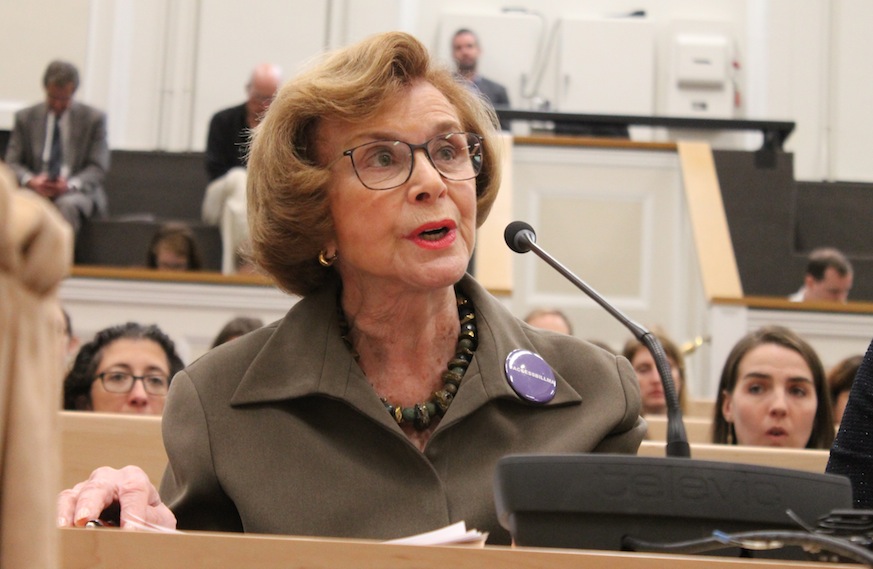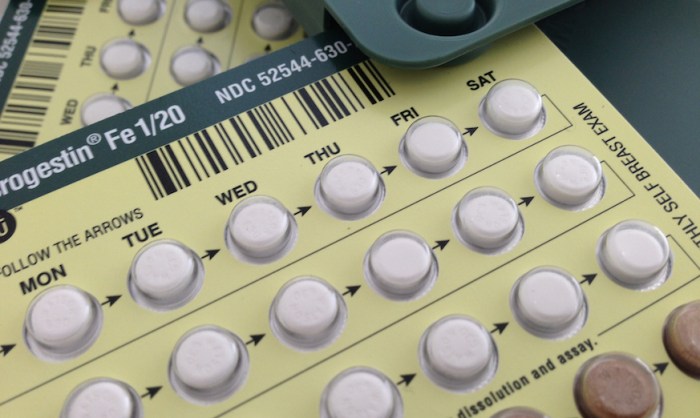The morning-after emergency contraception pill would be as accessible as a flu shot in Massachusetts and birth control pills could be purchased in 12-month supplies, under compromise legislation agreed to by the insurance industry and reproductive rights advocates.
The compromise does not include provisions in an earlier version (S 499/H536) of the legislation that would have mandated free condoms with insurance coverage and vasectomies without co-pays, according to supporters.
“We have again put Massachusetts in the prime position to lead,” Elana Margolis, a lobbyist for Blue Cross Blue Shield of Massachusetts, said at a press conference before a Financial Services Committee hearing on the legislation Tuesday.
Margolis was joined by representatives from NARAL Pro-Choice Massachusetts, Planned Parenthood, the American Civil Liberties Union of Massachusetts and the Massachusetts Association of Health Plans in support of the compromise.
The original bill sponsored by Senate Majority Leader Harriette Chandler, of Worcester, and House Speaker Pro Tempore Patricia Haddad, of Somerset, would have made the emergency contraceptive known as the morning-after-pill free without a prescription. Under the compromise there would be a standing order for the emergency pill at pharmacies, similar to the standing order in place for flu shots. That means insurers would be able to monitor how the emergency contraceptive is being used, according to Lora Pellegrini, president of the Massachusetts Association of Health Plans.
“We can collect pharmacy information and ensure that there isn’t abuse of this,” said Pellegrini.
The insurance industry and women’s health advocates probably agree that emergency contraceptives should not be used as regular birth control she said. The emergency contraceptive, which is available over the counter, costs about $50, Pellegrini said.
Supporters of the legislation said it would also serve as a bulwark to preserve access to contraception coverage in case Congress repeals the Affordable Care Act, which guarantees co-pay free coverage for certain contraceptive methods, or if the Trump administration chips away at those provisions through regulatory changes or executive orders.
“Given the risk the current administration poses to women’s health, it is imperative that we pass this legislation to protect all women in the Commonwealth – no matter their financial ability,” Chandler said in a statement.
The contraception access bill has dozens of co-sponsors including Rep. Jeffrey Sánchez, chairman of the House Committee on Ways and Means, Rep. Peter Kocot, the House chairman of the Committee on Health Care Financing and Sen. Jamie Eldridge, the Senate chairman of the Financial Services Committee.
“Women’s health care is under siege,” Pellegrini told the committee.
Amy Wipfler, a 26-year-old Jamaica Plain resident who now works at a bike-share startup, told the Financial Services Committee that before the Affordable Care Act took effect she decided she wanted an implantable birth control device known as a intrauterine device, or IUD, but could not afford it.
“They told me it was going to be $900,” said Wipfler. She said, “I was so excited months later when the ACA did come into effect.”
Rep. Marjorie Decker, a Cambridge Democrat who sits on the Financial Services Committee, commented that contraception access would be a non-issue if men faced the same consequences as women.
“We know that if men could give birth, we would not be sitting here,” Decker said.
Access to birth control allows women to have control over their career path and financial health, said Jesse Mermell, president of the liberal Alliance for Business Leadership. She said research shows that birth control has helped elevate women’s pay so that it is closer to their male counterparts.
Chandler said she wants the Legislature to pass the bill as quickly as possible and she told the News Service that given the broad agreement on the compromise, she feels the only major stumbling block is a review of the legislation by the Center for Health Information and Analysis (CHIA).
“I’d love to see it pass before the end of the year,” Chandler told the News Service. She said, “The only thing that’s missing is the CHIA report. We have consensus.”
Andrew Jackmauh, a spokesman for CHIA, said the agency is “in the process of evaluating the bill, as previously referred to us by the Joint Committee on Financial Services. We look forward to continuing to work with the Committee, and will evaluate any redrafted language sent to CHIA.”
Insurers had been reticent to allow women to obtain 12 months of birth control at one time because of concerns that it could be wasted or diverted, Pellegrini said. Under the compromise, a woman would first receive a three-month supply, and late could gain a full year’s supply, Pellegrini said.
When he was a candidate, Gov. Charlie Baker claimed that the U.S. Supreme Court’s Hobby Lobby decision allowing businesses to deny employees contraception coverage on religious grounds would not affect Massachusetts because of existing state laws. On the following day Baker said he had misspoken and the ruling could allow a “small segment of employers” to “qualify for the narrow exemption” to mandated coverage that the high court provided.
“As Governor, I will work to ensure that Massachusetts employers continue to offer comprehensive health insurance coverage, including contraception, to their employees,” Baker said in 2014.


















